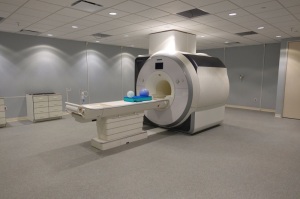by
John R. Fischer, Senior Reporter | November 26, 2018

The cloud is expected to provide infinite
archiving and on-demand computing power
as required for deep learning, AI & other
applications used in MR.
Picture: Siemens Prisma 3T system at
Columbia Magnetic Resonance Research Center
A patient undergoing an MR scan may soon be in and out in a fraction of the time, thanks to a new partnership between the department of radiology at NYU School of Medicine and ubiquitous social media giant Facebook.
The two are pooling their resources into a new artificial intelligence project called FastMRI, with the goal of making MR scans ten times faster without compromising image quality.
“This particular collaboration starts at the beginning of imaging MR and has to do with image acquisition and reconstruction of the image,” Dr. Yvonne Lui, a neuroradiologist and associate chair of artificial intelligence in the department of radiology at NYU School of Medicine who is heading the project, told HCB News. “The focus is on how we can acquire less data in order to make the same quality diagnostic image.”



Ad Statistics
Times Displayed: 172774
Times Visited: 3129 For those who need to move fast and expand clinical capabilities -- and would love new equipment -- the uCT 550 Advance offers a new fully configured 80-slice CT in up to 2 weeks with routine maintenance and parts and Software Upgrades for Life™ included.
Like Lui, many radiologists and other clinicians are investigating the potential uses of AI and machine learning for MR scans, with applications ranging from tumor segmentation to lesion detection, to image classification.
But AI is merely one emerging area of interest within the MR world, with each poised to have its own impact on the ways in which scanners are used, the quality of care delivered to patients and the affordability of exams.
AI and the cloud
A typical MR scan ranges from 15 minutes to over an hour and requires patients to remain very still and hold their breath for lengths of time in narrow bores when imaging certain regions of the body. For many, particularly children, these conditions are uncomfortable, and can cause anxiety or claustrophobia.
While Lui and her colleagues hope to use machine learning to reduce these experiences by decreasing scan time, she says right now there is also a lot of interest in lesion detection and image classification.
“Is there cancer or no cancer? Is there a bleed or no bleed? Is there something abnormal and if so, where is it and can you put a box around it?” she asked. “Detecting and interpreting images is where a lot of the interest lies.”
FastMRI is hardly the only artificial intelligence initiative taking aim at MR, but all of these endeavors – regardless of what their individual goals may be – share a fundamental need.
With any of these applications comes the need for scalable infinite memory, infinite archive capacity and on-demand infinite computing power, all of which can be found in the cloud.
“It’s the only way to combine these bigger bodies of data into one, large coordinated resource that allows us to operate together more efficiently,” said Dr. John Thomas Vaughan, Jr., a professor and director of the Columbia MR Research Center at Columbia University.

